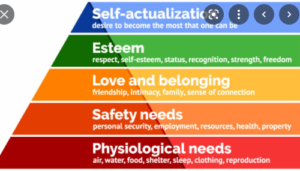In today’s complex environment, who doesn’t want to be motivated?
Motivation is defined as the desire to perform or act in a way that fulfils particular circumstances, such as wishes, desires, or goals.
Going a step further, psychologists believe that motivation is based on a basic desire to maximise pleasure while minimising physical suffering.
But where does inspiration originate from?
Is it from our brain?
If that’s the case, from which area of the brain is it, and why should we care?
Because when you’re on the verge of giving up or struggling to push yourself to the next level, that time you need is only one thing-that is motivation.

As a source of motivation, neurotransmitters play a critical function. Neurotransmitters are often referred to as the body’s chemical messengers, as you may know.
They are the chemicals that the nervous system uses to send and receive messages between neurons and between neurons and muscles.
Two neurons communicate with each other in the synaptic cleft (the small gap between the synapses of neurons). Neurotransmitters transform electrical signals travelling along the axon into chemical signals, resulting in a specific response.
Chemical messages are sent by neurotransmitters to keep us alert and focused. Neurotransmitters are chemical messengers that deliver chemical messages from your brain to the rest of your body.
Dopamine is one such neurotransmitter, and it is responsible for motivation. Dopamine’s chemical signal is transferred from one neuron to the next, and dopamine interacts with different receptors inside the synapse between those two neurons.

When you expand the effect throughout the entire brain, things get a lot more complicated. Consider this: neurotransmitters can go through a variety of receptors, neurons, and routes.
It matters which pathway dopamine takes when it comes to motivation. The most important reward pathway in the brain is the mesolimbic pathway, which originates in the centre of the brain and branches out to numerous locations such as the cerebral cortex.
The nucleus accumbens is one of the mesolimbic’s pauses. The nucleus accumbens generates feedback for forecasting rewards when the level of dopamine in the brain increases. Dopamine is released when your brain detects that something significant is going to happen.
Result?
You feel motivated.
The most intriguing aspect is that Dopamine executes its functions before we receive rewards, implying that its primary function is to motivate us to act, either to achieve something positive or to avoid something negative.
Most people thought dopamine was the pleasure neurotransmitter, but when researchers examined it closer, they noticed unusual things.
Dopamine levels spiked when people were under a lot of stress.
Like the sound of the starter’s cannon has been known to cause excessive alert and stress among Olympic runners. Those aren’t exactly enjoyable experiences, but dopamine was.

People who were willing to work hard had higher dopamine levels in the striatum and prefrontal cortex, two brain areas known to influence motivation and reward, according to one study.
According to another study, low dopamine levels make people and other animals less motivated to work for things, so it’s more about motivation and cost-benefit assessments than pleasure itself.”
The importance of dopamine in relation to motivation in our lives is highlighted by the account of our son’s work in a B2B IT company during his student years.
As my son had nothing to do after his final semester of graduation exams, he joined a Noida-based b2b company as a business associate. He seemed ecstatic to have the opportunity to work for a corporation throughout his undergraduate years. He even conducted a comprehensive Google search on the company and emailed me the results. I encouraged him by telling him that everything is OK; all he needed to do was assess his motivation level.

Because motivation might wane over time, keep an eye on your motivation level, which is especially important for employees at different companies. Though money and a good wage package are important motivators, I questioned him if his constancy on the job is determined by how driven he is.
Your motivation should constantly be high, allowing you to perform more effectively.
He appeared fully enthusiastic, boost up and full of energy despite still being a student who had the opportunity to work over the semester break. He went through a seven-day hard training programme before joining on the eighth day. We had a telephonic talk every day after his duty hour about his experience, his working environment, and everything else with me.
He stated that everything was well and that working in an IT firm was a terrific experience.
His enthusiasm is clearly appreciated, given he is still a student pursuing graduation.
Everything seemed to be in order. He abruptly quit his job after only seven days on the job. I inquired as to what had occurred. He said I had lost all motivation and had stopped.
What went wrong when everything was fine and he was working hard from 9:45 a.m. to 7:45 p.m.? I came to discover Maslow’s Hierarchy of Needs while trying to figure out and dig deeper.
Maslow’s hierarchy of needs is a psychological concept introduced by Abraham Maslow in his 1943 work “A Theory of Human Motivation” published in the journal Psychological Review. Maslow further expanded the concept to include his observations of people’s natural curiosity.
Higher levels of Maslow’s hierarchy of wants can only be pursued after the lower levels have been met.

Physiological Prerequisites

Physiological needs, such as the need for air, food, and water, are the most basic of Maslow’s demands. When you’re starving, for example, your entire conduct may be driven by the need to find food. The quest for food stops once you eat, and the need for food no longer propels you.
Safety Requirements

People tend to become concerned about safety concerns once their physiological demands have been met. Is it safe for them to be free of danger, sorrow, and an unknown future? They will be driven at this point to aim their behaviour toward getting refuge and protection to meet this need.
Needs for Love and Belonging

After basic safety requirements are addressed, social demands for love and belonging become more important. This can include the want to connect with other people, the desire to be loved, and the desire to build long-term relationships. Having no attachments can have a negative impact on one’s health and well-being, thus people are compelled to make new friends and romantic partners.
Needs for Self-Esteem

Once the demands for love and belonging have been met, esteem becomes more important. The need to be respected by one’s peers, to feel important, and to be recognised is referred to as “esteem needs.” People will frequently seek ways to gain a sense of mastery, and they may seek affirmation and praise from others to do so.
Self-Actualization

At the top of the hierarchy, the focus switches to the need for self-actualization, which is essentially the same as realising one’s full potential. This can be observed in the acquisition of new abilities, the acceptance of new challenges, and the behaviour that will assist you in achieving your life goals. Self-actualization represents the humanistic emphasis on positive aspects of human nature, according to Maslow and other humanistic theorists. Maslow proposed that this is a continuous, life-long process, with only a small percentage of people achieving self-actualization.
As you can see in the example of my son, once his attention is drawn to the need for self-actualization, such as receiving so many abusive phone calls and complaints from various clients every day, he becomes self-aware that the profession is not a good fit for him.
His entire motivation as a member of the team had dwindled, prompting him to resign.
As Maslow mentioned, self actualization is a lifelong process that only a tiny fraction of individuals attain, our goal is to be in a condition of self actualization that will encourage us to achieve larger life goals on a consistent basis.
So, what’s the secret to raising dopamine levels, which leads to a state of self-actualization and keeps us motivated?
Dopamine is linked to our desire to succeed on a biological level. Positive feedback can help you improve your dopamine levels (which happens by tracking incremental progress). You can also increase your ability to complete things by developing healthy habits.
# Include dopamine-rich items in your diet. Make sure you’re consuming foods that are high in natural probiotics, such as yoghurt and sauerkraut, as well as natural glucose, which may be found in raw fruits and nuts.
# Take a ten-minute power nap. According to research, 10 minutes is the ideal length. After that, you may have “sleep inertia,” which makes you lethargic and unproductive.
# Switch between your right and left brain s. Anecdotal data suggests that being able to exercise both creative and analytical muscles will help you become a more well-rounded employee. To develop both sides of your brain and feel active on multiple fronts, alternate between Excel and an art project or a creative brainstorming session and more straightforward quantitative chores.
# Get up and about in the middle of the day. Even a 20-minute walk will help you feel better. And a short, high-intensity workout might boost your dopamine levels to unprecedented heights.
One of the simplest ways to improve your health is to begin practising yoga. Everyone knows a little bit about yoga, but are we all inspired to do it?
Beautiful yoga postures and tips can be found here.
This will undoubtedly boost your motivation to succeed and realise the benefits.
-End-
For other blog, you may click her:
Is there magic pill to get incredible life to heal depression?
How to calm the Amygdala Hijack naturally?
Why books so important to change your life
How Artificial intelligence is emerging as big role player in content writing


[…] all need to be motivated every day to keep going. However, motivation is not always easy to come by. What can you do when you’re having a really bad day and […]
[…] it can help you discover the bravery to attempt new things, develop the resilience to bounce back from failure, and increase your chances of […]
[…] What keeps us motivated to achieve the bigger goals in life? […]